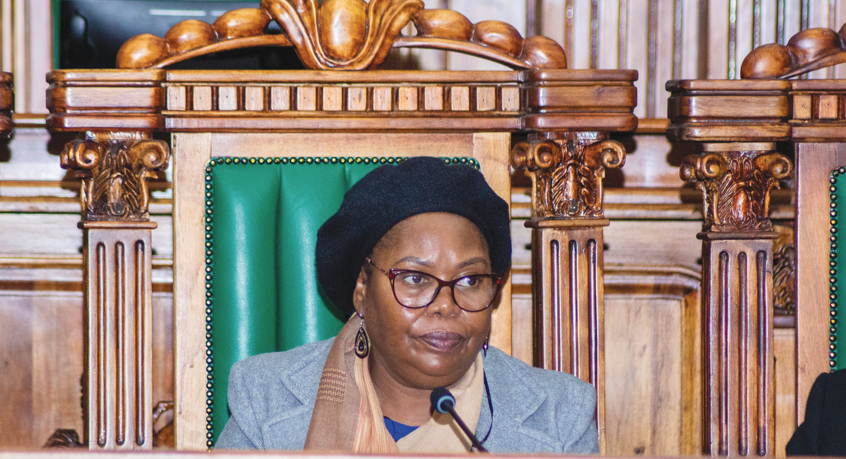Theko Tlebere
When the Public Accounts Committee (PAC) recently interviewed the Principal Secretary of the Ministry of Energy, the nation gained insight into an often-unasked but essential question regarding the functionality of our government: who supervises Principal Secretaries? How are ministries held accountable for their performance, and, more importantly, who ensures that Cabinet decisions translate into tangible results on the ground? At the heart of these inquiries lies a constitutionally empowered yet publicly under-scrutinised office: that of the Government Secretary (GS).
According to the Government of Lesotho’s official job description, the GS is more than a ceremonial coordinator or custodian of Cabinet documents. The GS is, in fact, “the overall Head of the Civil Service,” responsible for coordinating the machinery of government, monitoring performance, and ensuring policy coherence across ministries. Unfortunately, most Basotho only see the GS at state funerals and official events. The seventh and final duty listed in the GS’s job description, presiding over official state functions, has become the most visible role, while the more strategic and impactful functions remain obscured in bureaucratic shadows. This misconception not only weakens public understanding of the office but also undermines accountability and governance reform.
The Prime Minister, the Right Honourable Ntsokoane Samuel Matekane, articulated this reality clearly in his inaugural speech on 28 October 2022. Speaking with boldness and urgency, he reminded the nation that, “It is against this backdrop that your new government is assuming the responsibility to preside over the affairs of Lesotho’s public service… to fix the public service to make it more efficient, transparent, accountable and effective.” In a rare public directive, he turned to the Government Secretary and instructed the office to deliver a list of outputs within the first 100 days, which includes preparing and signing performance contracts with Principal Secretaries, developing standardised performance reporting tools, and implementing a citizen feedback system. These instructions are not optional; they are rooted in law.
Section 12 of the Public Service Act of 2005 outlines the statutory functions of the Government Secretary.
It states: “In addition to the functions vested in the Government Secretary under Section 97 of the Constitution, the Government Secretary shall—
(a) co-ordinate the activities of the Principal Secretaries and transmit communication from the Principal Secretaries to Cabinet;
(b) be responsible for conveying the policies and discussions of Government to the appropriate person or authority and for ensuring that those policies and discussions are properly carried out by that person or authority;
(c) enter into performance agreements with the Principal Secretaries, supervise and monitor their performance; and
(d) have overall responsibility over all public officers.”
These are not ceremonial duties; they are strategic and operational responsibilities that directly affect how the government functions. For instance, the coordination of Principal Secretaries should ideally ensure that ministries do not work at cross purposes. However, in practice, many ministries operate in silos, contradict each other, or duplicate efforts. Who resolves these inefficiencies?
According to the law, it should be the GS. Likewise, communication from the Cabinet to ministries must pass through the GS. The Prime Minister emphasised this when he stated that the GS must “develop tools and a standardised system of performance reporting and reflection for the whole of government… and develop a system through which citizens can monitor and report on the performance of the public sector.” Such tools cannot be developed in isolation; they must be driven from the top, with commitment and oversight from across ministries. That is the GS’s domain.
Perhaps the most crucial, but often neglected role of the GS is performance management. According to both the Act and the Prime Minister, the GS must enter into performance agreements with Principal Secretaries and oversee their execution. The Prime Minister set a 30-day deadline for these contracts to be signed and made public.
These agreements are meant to ensure that every Principal Secretary is accountable not just to their line Minister but also to the overarching standards of the public service. Without this system, the public service drifts without guidance. Yet, despite this framework, the only role the public consistently observes the GS performing is presiding over official state functions. While this seventh responsibility may be the most visible, it is the least consequential to national development.
We must resist the urge to reduce this powerful office to that of a mere figurehead. The GS is supposed to be the operational heartbeat of government, the one who translates political vision into administrative reality. The Prime Minister made it clear that reforming Lesotho’s public service will not be easy. “The absence of a rigorous system of monitoring and evaluation,” he cautioned, “can easily foster a culture of impunity, in which there are no consequences for poor performance and wrongdoing.”
He promised that under his leadership, public officers would operate in a system where “performance… will be transparently stated and reported upon,” with open discussions about what has been achieved and which services have been delivered. That system starts with the Government Secretary.
To truly realise the Prime Minister’s ambitious 21-point programme, the GS must be more than a ghost in government corridors. The office must be visible, active, and accountable. It must provide quarterly updates on ministry performance, manage cross-cutting challenges such as donor coordination and decentralisation, and serve as the first line of response in cases of poor delivery.
Ultimately, Lesotho cannot afford a Government Secretary who merely presides over ceremonies while ministries falter. The Prime Minister has exhibited vision and urgency. The law has provided authority and clarity. The public has raised expectations.
Now the GS must lead from the front or risk being remembered as a missed opportunity in Lesotho’s reform narrative. The time has come to reclaim the full meaning and power of the Office of the Government Secretary. Not for spectacle, but for service. Not for presence, but for performance. Not for protocol, but for progress. The future is NOW!
Summary
- ” In a rare public directive, he turned to the Government Secretary and instructed the office to deliver a list of outputs within the first 100 days, which includes preparing and signing performance contracts with Principal Secretaries, developing standardised performance reporting tools, and implementing a citizen feedback system.
- “In addition to the functions vested in the Government Secretary under Section 97 of the Constitution, the Government Secretary shall—(a) co-ordinate the activities of the Principal Secretaries and transmit communication from the Principal Secretaries to Cabinet;(b) be responsible for conveying the policies and discussions of Government to the appropriate person or authority and for ensuring that those policies and discussions are properly carried out by that person or authority;(c) enter into performance agreements with the Principal Secretaries, supervise and monitor their performance.
- The Prime Minister emphasised this when he stated that the GS must “develop tools and a standardised system of performance reporting and reflection for the whole of government.

Your Trusted Source for News and Insights in Lesotho!
At Newsday Media, we are passionate about delivering accurate, timely, and engaging news and multimedia content to our diverse audience. Founded with the vision of revolutionizing the media landscape in Lesotho, we have grown into a leading hybrid media company that blends traditional journalism with innovative digital platforms.










